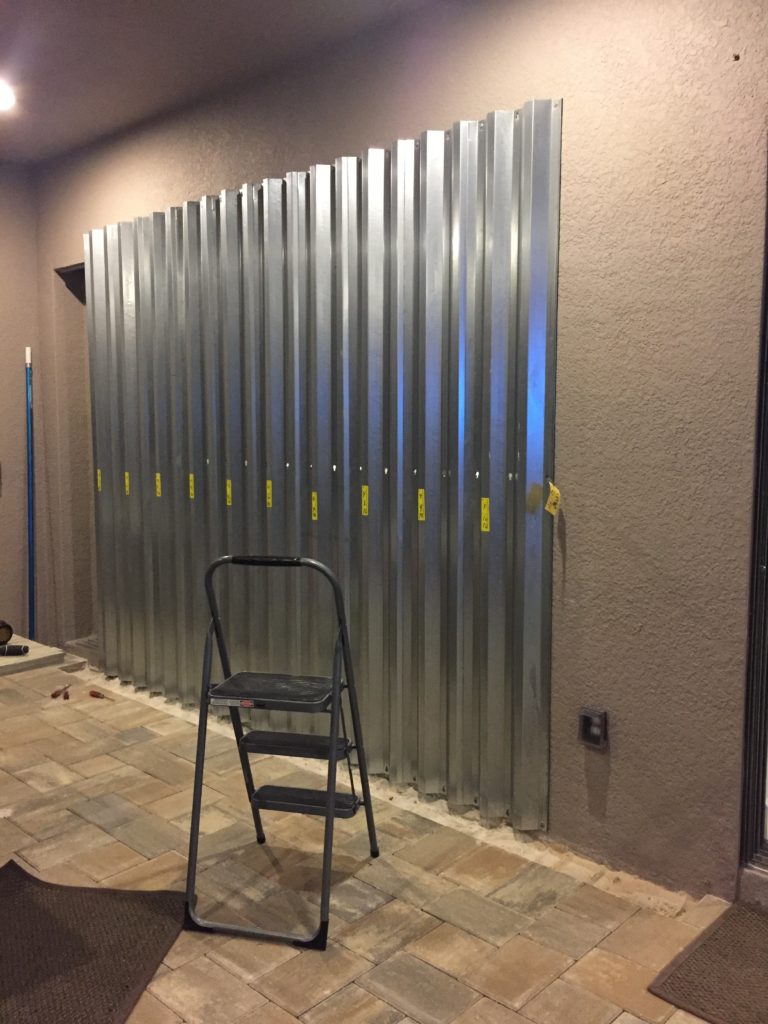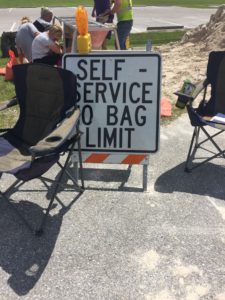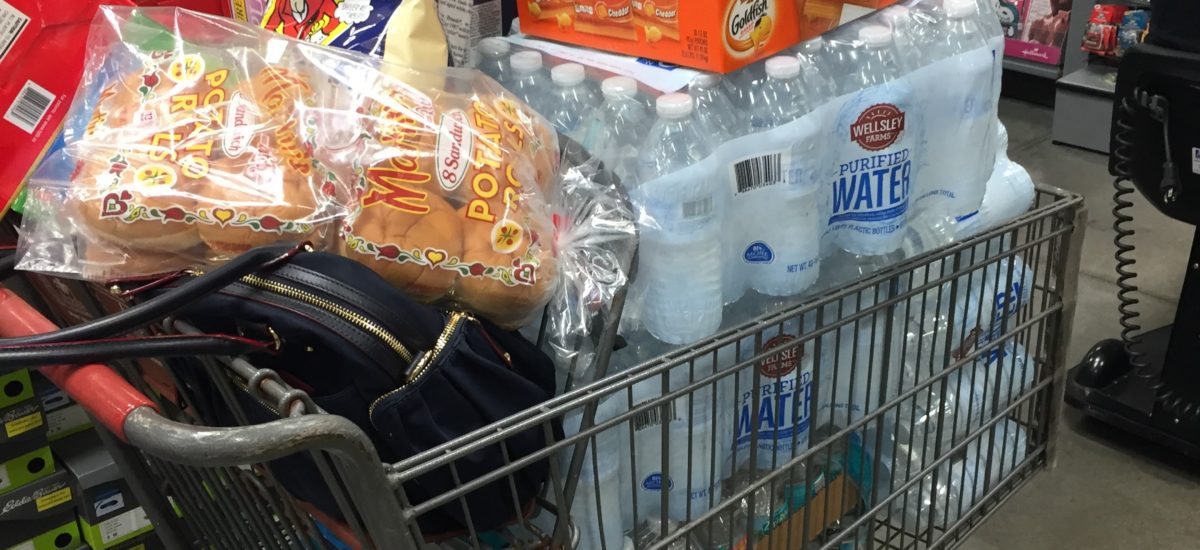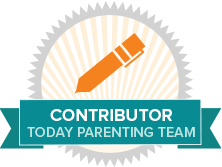This post may contain affiliate links. Please read our Disclosure Policy for details.
I’m typically a planner. Even though I thought I was ahead of Hurricane Irma with my prep, the hype caused enough hysteria very early on for other people to race to stock up on supplies. If you have a hurricane kit prepared well before hurricane season hits, you can order pretty much all of your items through Amazon and have them delivered directly to your door. Not all of the items below will apply to everyone’s situation, but take a quick look through and make sure to pick up what is relevant to you and your family’s needs. Here’s what I recommend having in your hurricane kit:
Hurricane Kit
Bottled Water.
The rule of thumb is one gallon per person per day. Assume the worst and plan for at least 7 days of no electricity. You can fill bathtubs with water ahead of the hurricane to use for emergency drinking or bathing. I like this bathtub liner to ensure that the water is sanitary and potable.
Food.
Let’s be honest, you’re not going to be very gourmet during a hurricane. It’s also challenging if you’re regularly accustomed to eating whole, natural, and fresh foods. If you’re health conscious, your best bet is to stock up on dried fruits and nuts, peanut or other nut butters, whole grain breads, beans, canned fruits and vegetables, crackers, tuna fish, and any fresh fruits and vegetables that don’t require refrigeration. Kids love snacks, so any type of bagged snacks such as goldfish crackers, popcorn, pretzels, cookies, fruit pouches, yogurt drops, and dry cereal should be sufficient to get them through. Make sure you have enough baby formula to last a week, if your baby is formula-fed. A good tip is to also have an ample supply of paper plates, bowls and cups and disposable silverware. And don’t forget about the pets! Be sure you have an ample supply of pet food on hand as well.
Flashlights.
Hubby and I used to train for triathlons and would run early in the morning wearing headlamps. I can’t tell you how many times since then those little headlamps have come in so handy. They’re LED, the light pivots, and they have an adjustable elastic band to fit any head size. Lanterns are also great because they can illuminate a room. I prefer lights that don’t require me to hold them, but you will also likely need a standard flashlight. I have this trusty little tactical one that got great reviews and is virtually indestructible. There are also hand-crank flashlights.
Fans.
Once the power goes out, so does the AC. And let’s be real, hurricanes typically happen in the dead heat of summer. Make sure you stock up on plenty of battery operated fans to try to stay cool.
Batteries.
You can never have too many batteries on hand for a hurricane, especially with young children around. Get every size and get plenty of them.
Radio.
A quick Amazon searchwill produce a ton of options for weather radios. Many of them come with a built-in flashlight and USB charging port, among other useful features. There are hand crank radios and battery operated ones. NOAA also has a radio to provide forecast information.
Cell Phone and Portable Phone Chargers.
Get a bunch of these and make sure they are all fully charged.
Waterproof Backpack.
I personally have this one. It’s a thick and durable material that is waterproof. God forbid you’re in a situation like we saw in Texas and need to be rescued by boat, you will want your important documents with you like birth certificates. You can safely tuck those documents into a ziplock bag and place the bag inside of the waterproof backpack.
Important Documents.
This includes birth certificates, photo identification, health insurance cards, home insurance policies, bank information, and your emergency plan.
Medical Necessities.
Be sure to have at least one week’s supply of your prescription medications, as well as your eyeglasses. If you have photocopies of your prescriptions, bring them along in case you need to fill a script when you’re away from home.
Cash.
When the power goes out everywhere, you will need cash if you’ve evacuated and need to purchase items on your evacuation route.
Blankets.
Make sure each family member has one that is easily packable, yet warm. I like fleece blankets for this purpose. You can roll them and stuff them into a backpack.
Sleeping Bags and Pillows.
These come in handy if you need to evacuate and sleep at a shelter. Children’s sleeping bags have certainly evolved, and you can even use a nap mat which has the integrated pillow.
Clothing and Shoes.
Make sure you have a week’s supply of clothing. Pack clothing for different weather scenarios, and don’t forget a poncho or rain jacket. You’ll want extra socks and sturdy shoes in case you have to forage through difficult terrain.
Sanitary and Personal Hygiene Items.
Prepare for any scenario while you’re out of your home. Ladies should factor in personal hygiene items like tampons, and children or babies will require wipes and diapers.
First Aid Kit.
You can build your own or purchase a ready-made kit. Be sure to include alcohol wipes, band aids, antiseptic spray, or a topical antibiotic medicine.
Garbage Bags, Disinfectant Wipes, Paper Towels.
If you’ve evacuated and are living out of your car, these items will come in handy. Our family got hit with the stomach bug when we evacuated for Hurricane Irma. I can’t tell you how handy these items where every time we had to stop to clean up whenever our kids got sick.
Multipurpose Tool or Pocket Knife.
You never know when you’re going to have to become MacGyver during a hurricane.
Duct Tape.
This can come in handy for a multitude of purposes.
Tarp.
Tarps can come in handy if your roof springs a leak or a window is blown in. You can cover holes and prevent further damage from wind or water. If you haven’t had time to repair a roof leak prior to the hurricane, your best bet is to secure the tarp over the area to minimize water from entering your home. If you notice that damage is caused during the hurricane, it’s best to wait until the storm is over before attempting to install a temporary fix until a professional can come out to assess and fix the damage.
Bungee Cord and/or Rope.
You may need to tie certain things down or secure items to the roof of your car.
Red Gas Cans.
As we saw last September, gas became a commodity. People were fighting at the pumps and stations were drained, leaving motorists stranded on the side of the road. Have red gas cans filled and at the ready if you need to evacuate. You can also use the gas to power up portable generators. *TIP: NEVER store the full gas cans inside of your car, the fumes are toxic. Tie them to the roof or secure them on a trailer hitch. If you’re storing them for purposes of fueling a generator, make sure they’re stored inside a shed, away from anything flammable. Never set up a generator inside of your house.
Whistle.
This can come in handy to get the attention of rescuers.
Life Vests.
In anticipation of a water rescue, make sure at the very least that your children have life vests.
Inflatable Raft and Oars.
If you recall from watching the hurricane in Texas on TV, people were being rescued by boats and many were navigating the flood waters on their own using pool floats and inflatable rafts. This is optional if you are daring enough or faced with such a dire situation. Because they’re fairly compact and easy to store, you can keep the raft in your hurricane bin and oars close by. The rafts come in varying sizes to accommodate one to four or more people. Some include the oars and a battery operated air pump.
Games.
Make sure you have a bunch of activities to keep the kids busy and entertained. Internet is likely not going to be an option, so the kids will have to learn what their parents’ childhood was like before the advent of modern technology. Puzzles, board games, and card games are good ways to pass time.
Hurricane Kit Maintenance
Review and update your kit before the beginning of each hurricane season. Check the expiration dates on your canned goods and make sure they aren’t dented, swollen, or damaged in any way. Be sure to store your canned goods in a cool, dry place inside your home. Use up any canned goods that are nearing their expiration date and replenish with new ones. Place the older items towards the front to be used first and the newer items towards the back. Place boxed food in a sealed container or a ziplock bag to prevent pests from getting into the box. If items don’t have expiration dates on them, write the date that you stored the item in the kit so you know for future reference.
Think ahead and prepare for any situation. Make sure your home and car are well stocked if you decide to weather the storm or evacuate.
Keep the contents of your kit in a plastic bin or garbage can with a lid. Store all documents and photocopies of documents in ziplock bags within the kit.
Reevaluate your family’s needs each year. Your children’s age will determine the necessity of many of the items. Donate unused items that your family has outgrown, like diapers or clothing.
Family Hurricane Plan
Coming up with a family hurricane plan is just as important as creating a hurricane kit. Make sure each member of your family has a copy of the plan and knows the details of it. Come up with an evacuation plan, including detours or alternate routes due to traffic. Make sure there is a communication plan, especially if you unintentionally get separated or your younger family members don’t have cell phones.
Know where your nearest shelter is located. Be sure to register, as they fill quickly when the hurricane is predicted to be a strong category. If you have a family member that has special needs, be sure to register with the city’s emergency preparedness division.
Property Preparation
Don’t wait for an impending hurricane to begin taking precautions to prepare your property. Regular property maintenance will minimize the risks of destruction in a hurricane. Have trees trimmed and low-lying branches removed. Inspect your roof for loose shingles or tiles and have them repaired and secured.
Clean out gutters and downspouts to prevent flooding.
Make sure your garage door is reinforced and up to code to withstand hurricane wind speeds.
If your home has a double front door, invest in a deadbolt for the top and bottom to prevent it from being blown in.
If you have hurricane shutters, make sure they fit on all windows and doors properly and that you have all necessary hardware to affix them to the house. Don’t wait until the impending hurricane to test them out. You want to hang them at least three days prior to the hurricane hitting.

Get sandbags and fill them. Your municipality might offer sandbags and filling stations in the days before the hurricane. You can use these to bolster your front door and garage doors.



Whether you evacuate or shelter in place, close all interior doors during the storm. If you stay in your home during a hurricane, you want to camp out in an internal room on the main floor that has no windows. This could be a closet or a pantry or a bathroom.
Remove all outdoor furniture or any items that could become projectiles. If you can, store the outdoor items in your garage or inside your home. On the day of the hurricane, you can throw outdoor furniture into the pool (assuming it’s water resistant) so that it won’t blow away. Don’t leave it in the pool for an extended period of time, as the chlorine and chemicals might ruin the furniture.
Take photographs of the inside and outside of your home, including all contents and valuables. This is for insurance purposes.
Check with your local government for important information, including emergency hotlines and other resources.
If you evacuate and encounter flooded roads, remember the phrase “Turn Around, Don’t Drown.” Flash floods can occur and quickly flood roadways, making it impossible to determine the depth of the water.
If a hurricane is forecasted for your area, please evaluate and execute the best plan for you and your family. Whether you decide to shelter at home or evacuate from the area, the ultimate goal is the safety of everyone in your family.
As an Amazon Associate I earn from qualifying purchases.
© Copyright 2018 Twinstant Gratification, LLC
Tamar Blazer is an attorney-turned-twin mom, with a passion for her family, friends, writing, good food, home decor and laughing. When she’s not lamenting on her lack of sleep, you can find her doing one of the too many projects she likes to take on, usually with a twin on either side.









